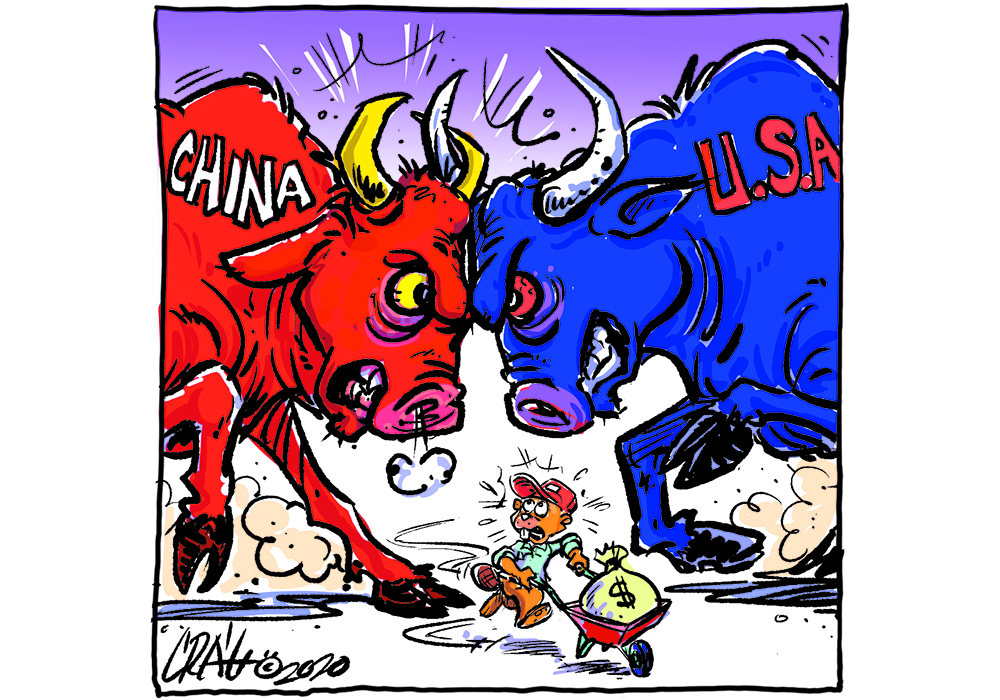War of trade giants precarious for Canada

The United States and China are not about to enter a shooting war any time soon, but their war of tit-for-tat is still damaging for those on the periphery.
Countries including Canada are poised to be winners and losers in this fight between economic behemoths depending on how these giants throw their punches.
Just when they seem to getting along better, something sets them off again. Mostly, it seems to be the result of U.S. President Donald Trump positioning things ahead of the American elections in November.
However, the war is not entirely one-sided.
Whatever the cause, the relationship appears to be as bad as it has been since the Vietnam War era, some veteran political watchers say.
The more desperate to win re-election that Trump and the Republican Party become, the more likely a serious mistake in dealing with China also becomes.
Last month, the Americans called out the Chinese for spying and kicked them out of the Houston, Texas, consulate. China responded a week later by kicking the Americans out of the consulate in Chengdu.
But is what happened in Houston new? The purpose of consular officials is to gather intelligence. The Americans were merely posturing for the business community and domestic voters. China had no choice but to play its side of the game and shutter U.S. operations in Chengdu.
If China had really been insulted, it would have closed a more important location. Instead it just moved some pieces on the board, irritating though it was for the U.S.
Adding to those mutual irritants are American complaints about the way China is treating Hong Kong, which is a property of China whether anyone likes it or not.
In the same month, the U.S. chose to describe Chinese expansionism in the South China Sea as illegal under international law. It appears American interests also put enough pressure on the newly independent Britain to cause that country to shut out Huawei, the Chinese tech company intent on moving into other markets.
And let’s not forget the diplomatic vexations caused by COVID-19 or, as Trump likes to call it, the China virus. His approach to it, from blaming China for intentionally developing and spreading the disease to covering it up and distorting the World Health Organization’s reporting, must aggravate Chinese officials. These are the same officials on which the Americans are placing financial sanctions.
The combination makes the Trump administration look tough, but at some point this jabbing might go too far and prompt China to punch back hard. Maybe that is what the U.S. president wants.
Canada needs the U.S. far more than it needs China as a trading partner and investor. However, Chinese influence and potential should not be overlooked. That influence is growing relative to the U.S. and offers plenty of future opportunity.
China is buying an increasing amount of agricultural products from the U.S. Corn, pork and beans are all attractive to China. America is awash in the first two and has the ability to supply the third.
All of this scrapping is taking place without a referee. China has failed to respect the World Trade Organization ruling against its domestic wheat production subsidies, an accusation levelled by the U.S. (See our front page story for details.)
For Canada, it is important to maintain good relations with both the U.S. and China to ensure that opportunities for short- and long-term trade remain open to us.
Our own history with the detention, on behalf of the Americans, of Huawei’s Meng Wanzhou isn’t helping but letting her go is not likely to help either, even if it did spark the release of two prominent Canadians detained in China.
Our country and government continues to face a precarious balancing act with respect to these two giants. Choices will eventually have to be made. Government is going to need every guidance, and heed that guidance, to choose correctly.
Karen Briere, Bruce Dyck, Barb Glen and Mike Raine collaborate in the writing of Western Producer editorials.

No comments:
Post a Comment